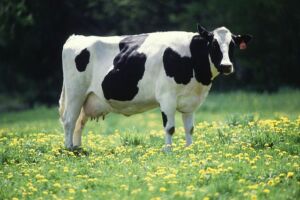Business
European farmers drowning in milk
This article is more than 10 years old.
The Russian embargo, abolition of milk quotas and falling Chinese imports have left farmers swimming

Slow down there, bossy! (photo: Keith Weller)
Milk farmers from France, Germany and the Netherlands are driving a convoy of tractors towards Brussels today to protest against falling farm incomes as the EU agriculture ministers meet to discuss what can be done for dairy farmers.
Falling milk prices have placed heavy economic pressure on dairy farmers who are not earning enough to continue production.
“European dairy farmers find it difficult to make ends meet,” agricultural consultant Susanne Clausen told DR Nyheder. “They are having a hard time recouping costs.”
China and Russia key
Clausen said that declining sales in China have been a crucial factor in the fall in milk prices.
“China increased imports quite sharply in late 2013 and early 2014, but that did not cover rising milk consumption in China, so they built up their stock of milk powder,” said Clausen. “Those stockpiles mean the Chinese no longer import as much milk.”
READ MORE: Steep drop in milk prices a huge blow to dairy farmers
Plunging milk prices are affecting farmers across Europe, and it is not just China’s lack of imports that are wreaking havoc.
“The Russian import ban introduced a year ago is also playing a role. Russia and China are the largest importers of milk on the world market.”
Instability continues
European farmers are currently sitting on a very large milk surplus.
“Production increased as a result of very high milk prices in early 2014 and a change in EU policy earlier this year,” said Clausen.
Clausen said that price fluctuations were likely to continue with periods of both high and low prices.










































